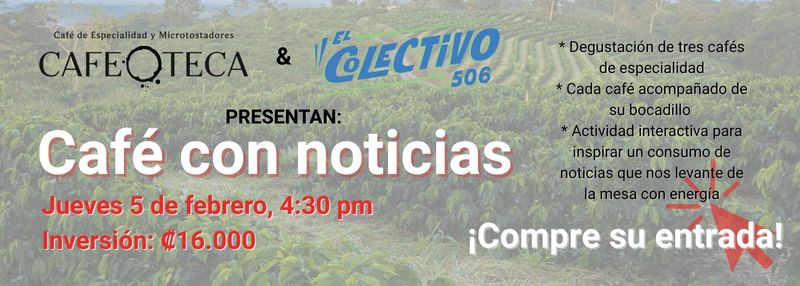A Zoom chat with Dakota Bishop reminded me instantly of so many of the reasons I’ve become a stalwart fan of Returned Peace Corps Volunteers over the years. It’s their deep commitment to service; their insightful perspective on rural Costa Rica; and the depth of their affection the country, which often results in continuing personal and professional ties. For Dakota, this has led him to his current position as the Program & Administrative Coordinator at Amigos of Costa Rica, a U.S. nonprofit that connects donors with more than 100 Costa Rican nonprofit affiliates to help them raise funds.
He kicked off our reader-focused November edition by chatting with El Colectivo 506 about his service, which took him to Aguas Claras, Desamparados, and Turrialba from 2016-2019. He also offered up one of the best travel hacks I’ve ever heard, courtesy of his friend, Chris.
Excerpts follow.
For so many people, a love for Costa Rica starts with tourism, but Peace Corps Volunteers have such a different point of entry into the country and the culture. What was that experience like for you? What are some of the sounds and smells and sights you remember most?
The Peace Corps is the huge majority of my experience with Costa Rica, but it actually isn’t where it all started for me. One of the reasons why Costa Rica was the place that I applied to for my service was because of prior experience that I had way back in 2007, when I did a mission trip for a little Methodist church in Las Juntas de Abangares. The way it was described was: they needed someone “who could play soccer and speak a little Spanish.” And I checked both of those boxes. Just barely. I was like, “Well, I don’t even know where that is, but I’ll go.” And so that was how it all started.
From there, it was like every other story you hear about someone’s first time in Costa Rica: I fell in love with the place and the people.
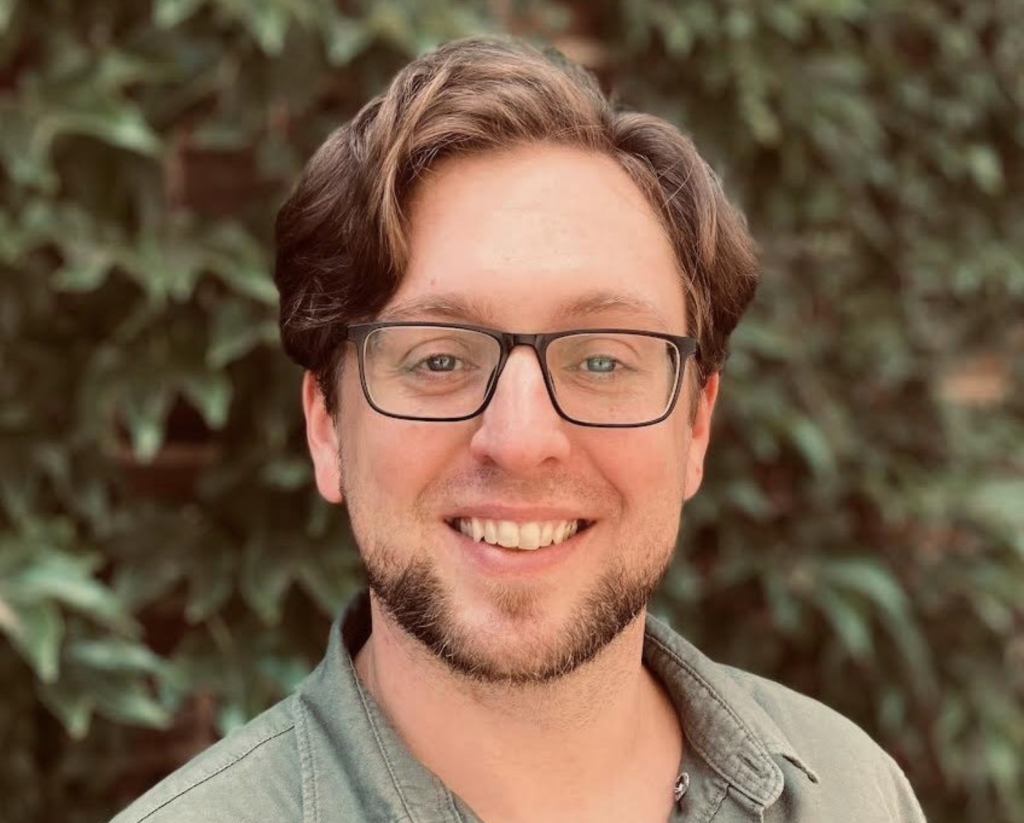
Almost a decade later… I was living in a rural community as a Peace Corps volunteer. The name of my first community was San Isidro de Aguas Claras, just outside of Upala. It’s funny that you mention sights and sounds and smells: easily, one of the best smells was waking up to fresh coffee being made by my host mom, and then sitting on the front porch and feeling that cool morning breeze going, sipping that coffee and hearing all the chisme (gossip).
I’m actually an introvert, and it can be tough for an introvert to be a successful Peace Corps volunteer. My nature is to not go out and explore, or put my name and my face out there. But I signed up for a reason. Eventually, you say: If I’m going to get anything done here, I’ve got to go meet people.
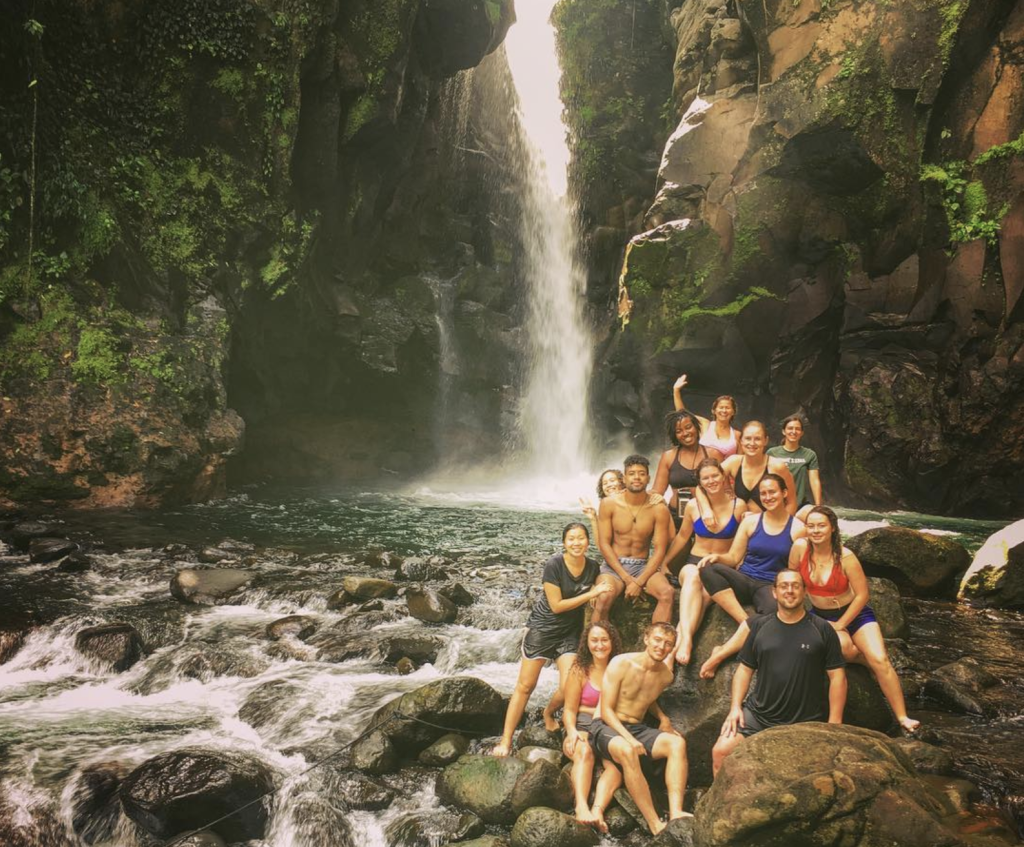
I’m an introvert, too. Do you think there’s something in the way that many Costa Ricans relate to each other, the joking and the fact that we stick out as foreigners, that helps us? You can’t take yourself too seriously.
Yeah. We do stick out, and you can’t get around that. One of the biggest [cultural] differences I experienced was how people communicate: they use sarcasm and humor to say so many different things in so many ways.
What kind of work did you do there?
The president of the ASADA [community water management association] was my official project partner. He would invite me to the meetings with my barely beginner Spanish. But they were so patient with me, so that I could get involved and brainstorm, get some ideas down on paper, figure out what the needs are… There’s so much to be said about just walking down a dusty road with a student in one of my English classes, or a distant family member from my host family, and just listening. Figuring out who this person is and their journey and their dreams. Putting this gigantic puzzle together in this tiny town off the beaten path. I look back on it insanely fondly. I really do.
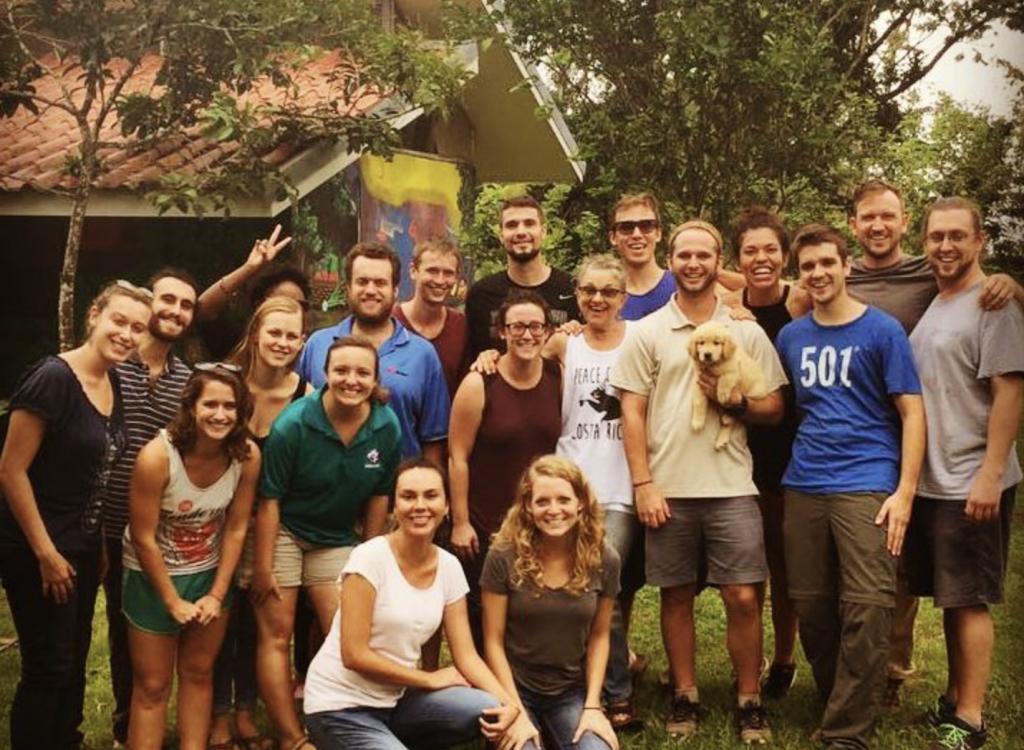
A lot of what we’re doing at El Colectivo 506 is trying to figure out how to achieve greater representation for voices from rural Costa Rica in the national media. What are some of the issues you experienced in rural communities that you would love to see reflected or explored?
The issue of access to resources in the local municipalities. As an example, there is a road that connects Aguas Claras and Upala, and it goes through this little town of Las Armenias. For the longest time it took forever to get anyone in Upala, where the municipality is located, to pay attention enough to say, “Ok, we’ll at least come out and take a look at the status of the road to see if we can look at maybe paving that.” The 10,000-foot view is, “It’s just a road. Big deal. The buses have gigantic tires.” But it’s so much more than the ability of a bus to pass by. It’s access for a lot of other services—for families to get from one end of the town to the other. When it comes to trying to start a small business, it’s access for other types of materials to get to and from the community. So that’s one thing that I’d love to [see reported on]: access to resources in smaller communities from these larger municipalities.
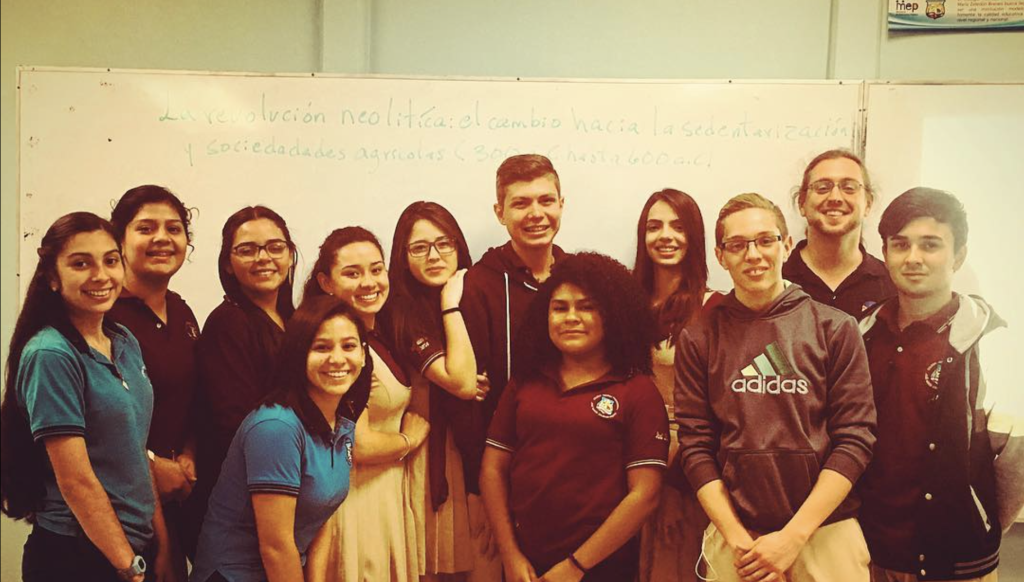
What are your tips for people who would like to experience more of rural Costa Rica?
Turrialba is one of my favorite places in the world… it’s in this little bowl surrounded by mountains, with so many outdoor adventures that you can take part in. For me, that was the sweet spot when it comes to living in rural Costa Rica. If you go to Limón through Turrialba, it takes you up and around that Cordillera; there are so many beautiful views along that route, so many awesome little towns with quaint sodas and colorful schools, right there on the side of the road. Don’t skip Turrialba.
There’s something else I want to share that’s not my story, but I can share it from a bystander’s perspective. One of my very best friends, Christopher Terrell, is a chaplain in the Navy. He came down to visit me, and as we did some of that adventuring off the beaten path, he would seek out individuals that made an impact on him, and he would ask if he could take a picture with them. I took some of the photos. I didn’t know at the time what his plan was, but today he has all of those pictures… framed on his wall. It wasn’t “just take a picture”—it was, “this person had an impact on me, and I want to remember this person.”
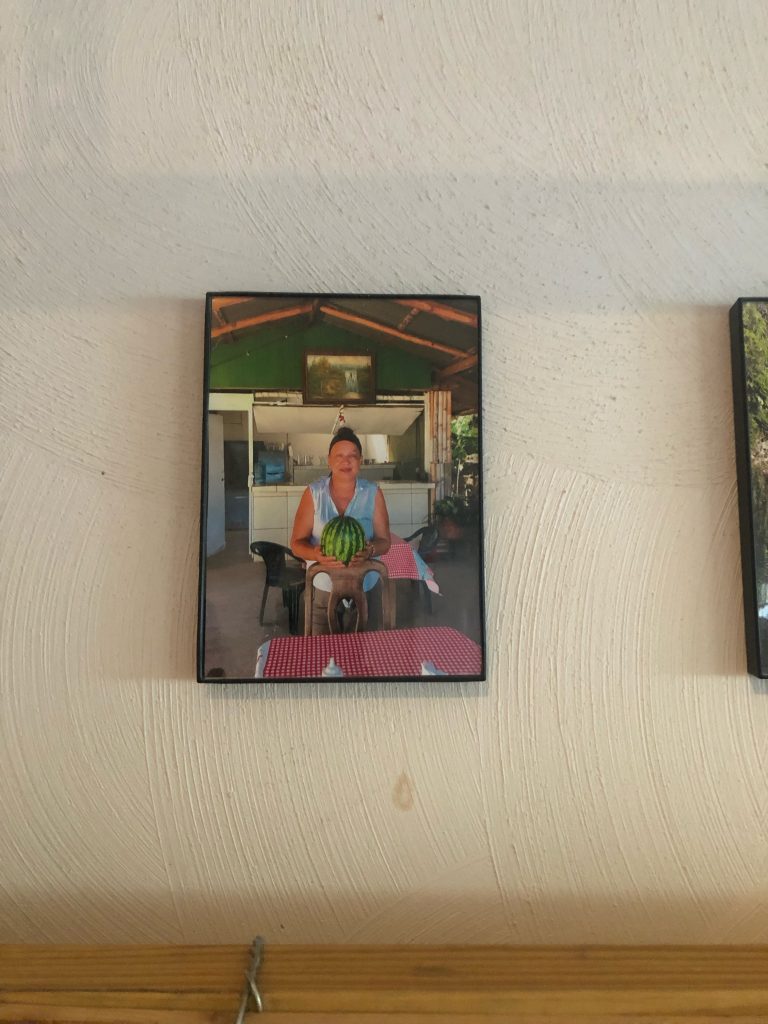
There was an older gentleman who had an art studio with recyclables somewhere south of El Tanque; a woman who runs a beautiful little colorful soda somewhere in some tiny town on the Pacific Coast; a young man who was playing soccer, kicking a ball against the side of the house as we were heading back to our Airbnb somewhere over in Guanacaste. And we started with conversation. He’s got a picture of every person, and a story that goes along with each one.
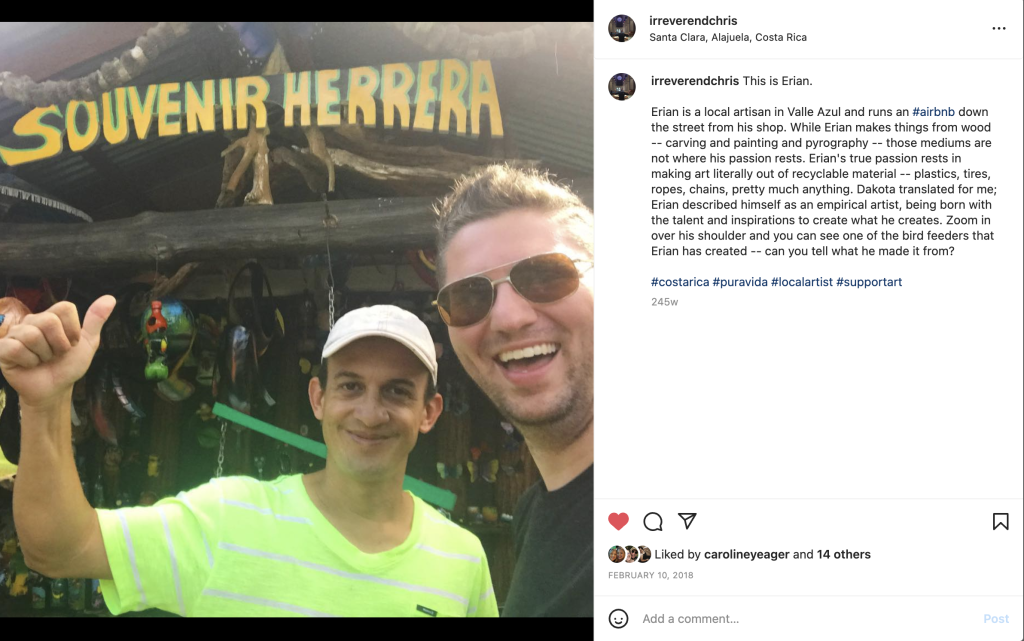
[With that] he improved not just his enjoyment of that experience in a nutshell, that one trip, but also his quality of life—because of his decision to go, not just to the big touristy hotspots, but also to have an experience in rural Costa Rica. An intentional effort to take your time and enjoy this for what it is.
What a beautiful thing to do. I like that for us introverts, too: if you or I were to decide to try to emulate that, it kind of sets a challenge for us. You’re not going to ask someone for a photo if you’re just walking by them. It kind of forces you to engage, if you’re shy.
Yeah. The cliché would be to stop and smell the roses, but that’s exactly what he wanted to do. He wanted to stop and smell the roses while he was down in Costa Rica, and I think it paid off in huge dividends for him.
Don’t be scared to go off the beaten path. Step out of your comfort zone. Go down that dirt road, kick up a little bit of dust with your tires. There are hidden gems that you’ll never see if you stay on Route 27 or 32. You’ll be surprised by the personalities that you’ll meet along the way, and the beautiful things that you’ll uncover.



